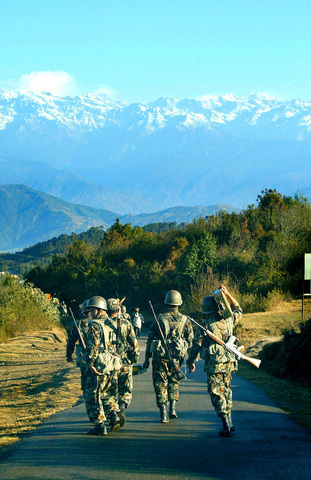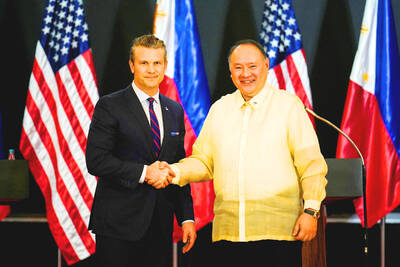Nepalese travelers hit the roads yesterday while food and other essential supplies began flowing freely into cities after communist rebels lifted a crippling two-week countrywide highway blockade to protest the king's power grab.
The rebels said Saturday that their decision was aimed at easing the discomfort of the common people. However, they threatened to step up their military campaign against the army.

PHOTO: AP
Fighting since 1996 to topple the monarchy and install communist rule, the insurgents blocked the country' highways using crude bombs, mines and boulders, disrupting basic supplies across the Himalayan kingdom and choking off major cities.
Yesterday, buses and cars that had been parked in garages for days ventured out onto the roads snaking through the mountainous country.
"We have had several telephone calls this morning from people who wanted to make reservations. Finally, it's business as usual," said Ram Shrestha, a ticket clerk at the local bus station in the capital, Kathmandu.
During the rebel blockade, vehicles piled up on the highways, waiting for security forces to clear explosives and escort civilian convoys to their destinations without being targeted by the insurgents. Prices of food and other essential items shot up across Nepal.
"We are lifting the indefinite blockade of transportation to show our deep responsibility toward the people," rebel chief Pushpa Kamal Dahal, also known as Prachanda, said in a statement late Saturday.
"We are going to start a new phase of movement increasing military resistance and mass movement of people," Dahal said without elaborating.
A Nepalese army spokesman declined comment.
The terror on the highways spiraled after indiscriminate firing by suspected rebels killed an Indian truck driver and wounded seven Nepalese last week.
Since then, airlines have been overwhelmed with bookings, even though only a tiny percentage of people in this impoverished country can afford air travel.
The insurgents said they were protesting King Gyanendra's decision on Feb. 1 to sack the government, impose emergency rule, and suspend civil liberties.
The monarch, who says he was forced to act because of the insurgency, has ignored repeated calls from the international community that he restore democracy.
Nepal's key allies, India and Britain, have suspended military aid and the US says it also is considering similar action. Several countries have withdrawn their ambassadors from Nepal and stopped aid.

‘EYE FOR AN EYE’: Two of the men were shot by a male relative of the victims, whose families turned down the opportunity to offer them amnesty, the Supreme Court said Four men were yesterday publicly executed in Afghanistan, the Supreme Court said, the highest number of executions to be carried out in one day since the Taliban’s return to power. The executions in three separate provinces brought to 10 the number of men publicly put to death since 2021, according to an Agence France-Presse tally. Public executions were common during the Taliban’s first rule from 1996 to 2001, with most of them carried out publicly in sports stadiums. Two men were shot around six or seven times by a male relative of the victims in front of spectators in Qala-i-Naw, the center

Incumbent Ecuadoran President Daniel Noboa on Sunday claimed a runaway victory in the nation’s presidential election, after voters endorsed the young leader’s “iron fist” approach to rampant cartel violence. With more than 90 percent of the votes counted, the National Election Council said Noboa had an unassailable 12-point lead over his leftist rival Luisa Gonzalez. Official results showed Noboa with 56 percent of the vote, against Gonzalez’s 44 percent — a far bigger winning margin than expected after a virtual tie in the first round. Speaking to jubilant supporters in his hometown of Olon, the 37-year-old president claimed a “historic victory.” “A huge hug

Two Belgian teenagers on Tuesday were charged with wildlife piracy after they were found with thousands of ants packed in test tubes in what Kenyan authorities said was part of a trend in trafficking smaller and lesser-known species. Lornoy David and Seppe Lodewijckx, two 19-year-olds who were arrested on April 5 with 5,000 ants at a guest house, appeared distraught during their appearance before a magistrate in Nairobi and were comforted in the courtroom by relatives. They told the magistrate that they were collecting the ants for fun and did not know that it was illegal. In a separate criminal case, Kenyan Dennis

The US will help bolster the Philippines’ arsenal and step up joint military exercises, Manila’s defense chief said, as tensions between Washington and China escalate. The longtime US ally is expecting a sustained US$500 million in annual defense funding from Washington through 2029 to boost its military capabilities and deter China’s “aggression” in the region, Philippine Secretary of Defense Gilberto Teodoro said in an interview in Manila on Thursday. “It is a no-brainer for anybody, because of the aggressive behavior of China,” Teodoro said on close military ties with the US under President Donald Trump. “The efforts for deterrence, for joint resilience